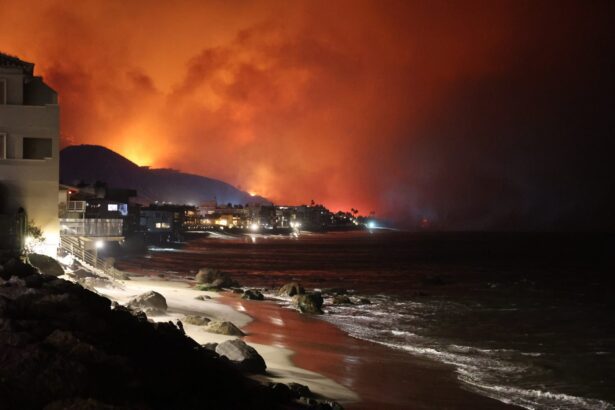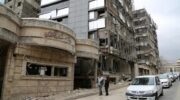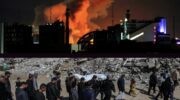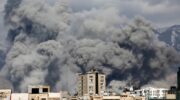Commentary by Ahmad Ibsais, Reposted from Mondoweiss
For the last few days, I have stared at my phone watching houses, history, and memories burn. But this time, it wasn’t Gaza. I was watching the Palisades burn. The hills are alive with fire, a haunting echo of another inferno raging thousands of miles away. For fifteen months, I’ve witnessed Gaza’s land, and people, burn through screens and headlines, and now as I watch the skies over an American city fill with smoke, the distances between these catastrophes collapse into a single, searing truth: these flames speak the same language of destruction – colonialism.
The fire consuming the Palisades isn’t just a California wildfire – it’s a mirror reflecting a global crisis of connected catastrophes. When I close my eyes, the images blur together: hills ablaze in California, olive groves burning in Gaza and historic Palestine, horizons choked with smoke that knows no borders.
Research from Lancaster University has revealed that in just the first sixty days following October 7, the military response in Gaza generated more planet-warming gases than twenty climate-vulnerable nations emit in an entire year. In a single month – October 2023 – Israel dropped 25,000 tons of bombs on Gaza, releasing climate-warming gases equivalent to burning 150,000 tonnes of coal. American cargo flights delivering weapons consumed 50 million liters of aviation fuel by December, spewing 133,000 tonnes of CO2 into our shared atmosphere – more than the entire nation of Grenada emits annually.
But this environmental catastrophe didn’t begin with the current Genocide. For decades, Palestinians have lived and worked sustainably with their environment, maintaining indigenous landscapes and growing a rich variety of crops from watermelon to olives – the latter forming a central part of Palestinian culture and identity. Since 1967, Israel has systematically uprooted at least 2.5 million trees in the occupied Palestinian territory, including nearly one million olive trees, which were a primary source of food and income for many Palestinians. Israel replaced these trees with imported European vegetation, perhaps reflecting their own European roots. This destruction has led to habitat fragmentation, desertification, land degradation, and soil erosion which affects the entire region’s climate resilience.
When we consider the climate cost of war infrastructure – the tunnels, the walls, the military installations – the total rise is 450,000 metric tonnes of CO2 equivalent, exceeding the annual emissions of 33 countries. Each bomb that falls on Gaza sends ripples through our collective future, its impact felt in rising seas, warming temperatures, and yes, in the fires that now threaten California’s hills.
I think of Gaza’s farmers, who for generations tended 170 square kilometers of flourishing orchards and fields – nearly half their land dedicated to feeding their people. Now, satellite images show a wasteland where gardens once grew. The Israeli military has destroyed 70% of northern Gaza’s water wells, demolished thousands of greenhouses, and transformed fertile soil into toxic earth. This has occurred alongside the decimation of 80% of all Gazan infrastructure. Between October 2023 and March 2024 alone, 48% of Gaza’s tree cover was lost or damaged, either destroyed by military operations or cut down by desperate people seeking fuel under the blockade.
The bitter irony doesn’t escape me: LA Mayor cut $17.6 million to its fire departments while California sent $610 million to Israel through taxpayers. The Wonderful Company, controlling nearly 60% of California’s water through the Resnick family, pumps millions into supporting the very territorial expansion that has turned Gaza’s landscape into an environmental catastrophe. That already, in 2025, Biden is trying to push for an additional 8 billion in military “aid” to fund a Genocide while thousands of U.S. citizens from Ashville, NC to Los Angeles are suffocating under the climate crisis. We are funding the flames that will eventually reach our own doorsteps.

The environmental wounds in Gaza will not heal easily. Thirty-seven million tonnes of debris now litter the landscape, a toxic legacy that will poison soil and water for generations. Each day, 130,000 cubic meters of untreated sewage pour into the Mediterranean Sea – not because Palestinians choose this devastation, but because Israeli violence has shattered their infrastructure, and their ability to care for their land as they have for countless generations.
When I see environmental activists who turn away from Gaza, I want to shake them awake. The reconstruction of Gaza’s 100,000 damaged buildings alone will generate 30 million metric tonnes of greenhouse gases – equivalent to New Zealand’s annual emissions and higher than 135 other countries, including Sri Lanka and Lebanon. This is a climate debt we all must pay, a fire we all must fight.
The flames I see consuming the Palisades carry echoes of Gaza’s suffering: homes turned to ash, landscapes transformed, and lives upended. But they carry something else too – an urgent warning about our shared fate. When we permit the bombing of Gaza’s aquifers and the poisoning of its soil, we accelerate the climate crisis that now sends California up in flames.
The ecocide in Gaza – recognized as a war crime under the Rome Statute – isn’t just a distant tragedy. It’s a harbinger of our collective future if we continue to allow environmental warfare and genocide to go unchallenged. As Benjamin Neimark from Queen Mary University of London warns, “The military’s environmental exceptionalism allows them to pollute with impunity, as if the carbon emissions spitting from their tanks and fighter jets don’t count. This has to stop.”
What burns in Palestine and Los Angeles today are symptoms of the same disease: a system that values conquest over conservation, profit over people, and expansion over existence. This is the legacy of a worldview that has sought to silence indigenous voices who understood what we must now learn – that the earth’s wounds are our own.
What you allow in Gaza, you allow everywhere. Today it’s their fields burning under thousand-pound bombs; tomorrow it’s our forests. The fires that connect us demand that we finally see this truth: we either stand together against this destruction, or we all burn separately.
Ahmad Ibsais is a first-generation Palestinian American and a law student. Find more of his works here.
RELATED:
- Israeli occupation of Palestine is devastating the natural environment
- Israeli trash is poisoning Palestinians in the West Bank
- Video: Israel poisons Gaza’s water, refuses access to UN mitigation team
- Israel is systematically poisoning one million Palestinian children
- Baseline of a Desecrated Place – Synopsis
- Israel spraying herbicides inside Gaza violates int’l law, rights groups say





